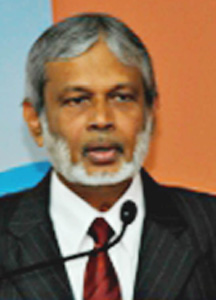Officials of the Telecommunications Authority of Trinidad and Tobago (TATT) at a public forum yesterday implored the Guyana Government to look for ways of collaborating with stakeholders in its bid to establish a modern broadcast authority.
Representing TATT at the forum organised by the Office of the President and held at the Regency Suites in Hadfield Street, Georgetown were Chief Executive Officer Cris Seecheran; Deputy Chairman Cagnay Casinire and officials Kwesi Prescod and Kirk Sookram. Present for the government were Prime Minister Sam Hinds, Head of the Presidential Secretariat Dr Roger Luncheon and CEO of the National Frequency Management Unit (NFMU) Valmikki Singh in addition to the staff of the Guyana National Broadcast Authority (GNBA), including its Chairman Bibi Shadick.
“You have to examine where you want to go and how youare going to get there,” said Casinire. “It depends on the path the government takes and what the objective of the government is,” he said.
Casinire said that in Trinidad, the TATT had to provide assurances to publishers in what he called a long, hard road which commenced some years before the authority began to operate. “We had to work for the trust of the broadcasters and publishers,” he said. “We took a lot of flak at the consultations,” he added. But he stated that because of the efforts, “we have what we think is a credible document which has gone through several rounds of consultation,” he said.

Pointing to the need for the authority to work with the stakeholders in the sector, Casinire said, “It takes two to tango… if the publishers could [come together with the authority the process would be smoother].”
Prescod pointed out that there were many similarities between Trinidad’s broadcast code and Guyana’s Broadcast Act. “The framework in Guyana is not that different from what we have in Trinidad,” he said. He stated too that even though the code in Trinidad is in draft form, all the broadcasters are adhering to it.
Dr Luncheon, seated at the head table, asked the TATT officials what would be the logical course for content regulation. To this, Casinire said that every environment has its own uniqueness. “It will be based on how you open up and what you want to do for your country,” he said.
Casinire said too that in Trinidad, “We don’t regulate local content.” He pointed to the opportunities that present themselves in the Diaspora for the growth of local content that might see a ready market to Guyanese populations overseas.
One member of the audience asked whether the TATT mandates or specifies transmission points in considering the approval of a licence to broadcast. To this, Seecheran said that the authority considers the application from the point of view of coverage, not from where a person transmits.
Seecheran pointed out that all of the plans for the spectrum in Trinidad are well known since TATT publishes them on its website. “The assignment of channels is there for all to see,” he said.
Enrico Woolford of Capital News asked why the necessity to focus on content when the Constitution makes provision for freedom of expression to be ensconced in responsibility. In response, Prescod said there needs to be further definitions of the terms as laid out in the laws or the Constitution. He stated that content and content management are challenges to be faced.
September 27, 2012 marked the shutoff date for all existing television station licensees to reapply for permission to broadcast from the GNBA. The Broadcast Act was passed in 2011 and made operational in August 2012
Following the expiration of the deadline for the submission of application for television licences, a number of television stations which had submitted applications prior to the deadline were up to three weeks ago still to receive acknowledgement from the authority as to whether they could continue to broadcast.
The opposition has heavily criticised the composition of the GNBA – formed under the Broadcast Act – and the way that former president Bharrat Jagdeo brought it into being. It is being seen as yet another attempt to muzzle dissenting voices and critics of the government.




